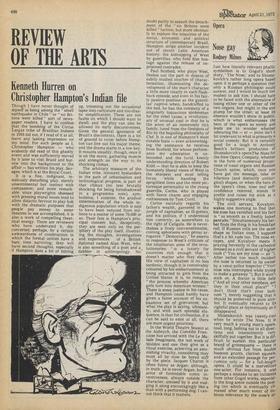Kenneth Hurren on Christopher Hampton's Indian file
Though I have never thought of myself as being among the "small earthquake in Chile" or " no Britons were killed" sort of newspaper readers, I have to confess that the bombing of the Cintas Laras tribe of Brazilian Indians in 1963 did not, if I read of it at all, leave any lasting impression on my mind. For such people as I, Christopher Hampton — who evidently did read of this ghastly. event and was sufficiently moved by it later to visit Brazil and burrow into the background to the affair — has written his play, Savages, which is at the Royal Court.
It is a fine, indignant, insidiously disturbing play, sternly unsentimental but instinct with compassion; and more remarkable since playwrights obsessed with pressing moral issues tend to allow didactic fervour to play hob with the dramatic purposes that people pay money to enter theatres to see accomplished, it is also a work of compelling theatrical energy. There are reviewers who have underrated it, disconcerted, perhaps, by a certain awkwardness of construction in which the formal unities have a harc time surviving; they will have second thoughts, especially if Hampton does a bit of tidying up, trimming out the occasional lapse into caricature and too-dras tic simplification. These are not faults on which I should want to dwell; and the play can also be allowed its early discursiveness. Given the general ignorance of Brazil's discontents, there is a lot of ground to cover before Hampton can line out his major theme, and the drama starts in a low key. It mounts steadily, though, once it is on the move, gathering muscle and strength on the way to its shocking climax.
The arbitrary massacre of the Indian tribe, innocent bystanders in the path of urbanisation and technological progress, is part of that climax (no less brutally shocking for being foreshadowed in a programme note), symbolising. I suppose, the gradual extermination of the whole indigenous population which is said to have been reduced from millions to a matter of some 70,000 or so. Their fate is Hampton's principal concern but, deceptively, they are seen only on the periphery of the play itself, illustrating the thoughts, investigations and experiences of a British diplomat named Alan West, who is also something of a poet and a dabbler in anthropology. No doubt partly to assault the detachment of the " no Britons were killed "faction, but more obviously to explore the iniquities of the social, economic and political structure of contemporary Brazil, Hampton strips another incident out of recent Latin American history: the kidnapping of West by guerrillas, who hold him hostage against the release of imprisoned comrades.
Paul Scofield, who plays West, fleshes out the part in dozens of subtly studied touches of characterisation, illuminating the development of the man's character a little more clearly in each flashback episode, and even in his fairly passive position as the guerrillas' captive when, handcuffed to the bed, he has the company of a singularly loquacious spokesman for the rebel cause, a revolutionary of unusual cast in that he is the scion of an immensely rich family, lured from the fleshpots of Rio by the beguiling philosophy of Che. It is one of Hampton's most notable feats — even acknowledging the assistance he receives from Scofield, for whose performance my admiration is unbounded, and the lucid, keenly understanding direction of Robert Kidd — that he is able to keep the :humanely liberal views of West in the sharpest and most telling focus, while handing the sprighliest lines and the more picturesque personality to the young guerrilla, Carlos, who is played with fierce charm and engaging ruthlessness by Tom Conti.
Carlos naturally regards his father's wealth, garnered in the jungle of capitalism, as ill-gotten, and his politics, if I understood him correctly, as somewhere to the right of Caligula. He is nevertheless a lively conversationalist, coining aphorisms with genial arrogance." Democracy," he asserts in response to West's criticism of the totalitarian aims of the revolutionaries, "is a luxury for countries rich enough that it doesn't matter who they elect." His view of capitalism is no less sardonic, though it is conceivably coloured by his embarrassment at being attracted to girls from the United States: it is, he remarks, "the process whereby American girls turn into American women." There is some justice in his cause, and Hampton could hardly have given a fairer account of his exhaustive set of grievances; but what the play is saying, ultimately, and with such splendid eloquence, is that for civilisation, if it can be said to exist at all, there are more urgent priorities.
In the World Theatre Season at the Aldwych, the Comedie Francaise has arrived with the Le Malade Imaginaire, the last work of Moliere and one they give as a ritual exercise, achieving an astonishing vivacity, considering they must all by now be bored stiff by the piece. Jacques Charon is often funny as Argan; although, in truth, he is never Argan, but an actor of formidable comic inventiveness, always outside the character, amused by it and nudging it along encouragingly like a man with a performing dog. I cannot think that it matters.


































 Previous page
Previous page